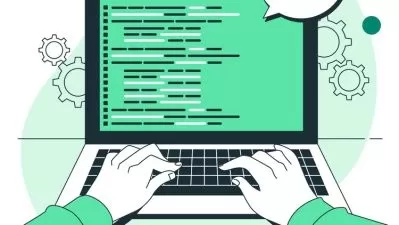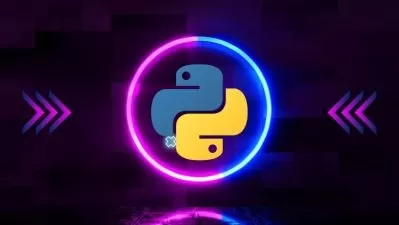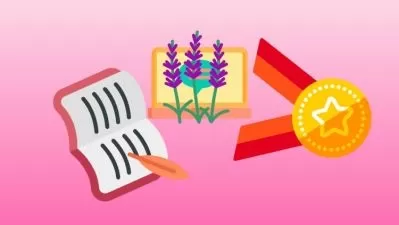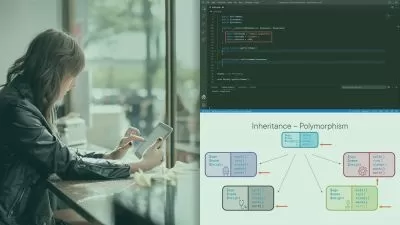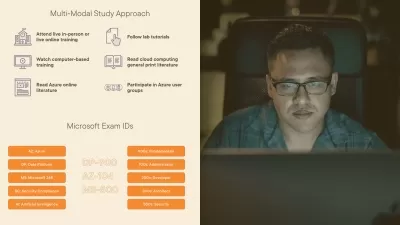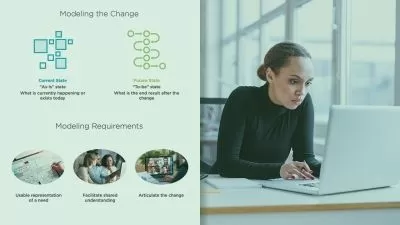Object Oriented Pirates programming adventure in Python
Loek van den Ouweland
1:30:22
Description
Use OOP to refactor growing code and turn small scripts into big programs with this Software Engineering exercise.
What You'll Learn?
- improve existing and future code by effectively refactoring code into small modules
- decouple your modules by using dependency injection
- make modules into plugins by using Polymorphism
- solve open-closed principle violations by using composition
- communicate your designs with UML class diagrams
- make confident design changes to split up scripts and refactor them into modules
Who is this for?
What You Need to Know?
More details
DescriptionThis course teaches you how to take a single script and use OOP techniques to refactor it into modules in a playful way. You learn Inheritance, Composition and Polymorphism and use UML to design and communicate the system. The customer keeps requesting new features that forces you to think about the right tool in the right place. Will OOP allow you to refactor the code each time without risk of breaking things? Prepare for a big exercise in organizing code!
Target audience
Developers who especially benefit from this course, are:
beginner programmers who want to practice OOP basics
developers who want to learn how to turn small scripts into logical code modules
developers who want to learn how to refactor code with minimal change and risk
Challenges
Students that are interested in this course often know basic Python features but are not yet aware of the role of OOP in structuring your code. Perhaps they have seen classes, objects, inheritance and polymorphism but they don’t know where and when to apply these techniques. This can lead to the wrong technique in the wrong place, which makes OOP useless and inefficient. Because this course focuses on changing code, you learn WHEN, WHAT and more important, WHY you can apply a certain OOP technique and perhaps even more interesting, when a certain technique is NOT appropriate anymore and needs to be replaced with another one.
What can you do after this course?
improve existing and future code by effectively refactoring code into small modules
decouple your modules by using dependency injection
make modules into plugins by using Polymorphism
solve open-closed principle violations by using composition
communicate your designs with UML class diagrams
Topics
Classes and Objects: Class instantiation, self, data attributes, UML, methods
Inheritance: When to use and not use Inheritance
UML: Use UML class diagrams to design and communicate your system
Polymorphism: Open-closed principle, prevent switches (if/else)
Composition: Replace inheritance with composition
Refactoring: Split up scripts and make a system modular to achieve single responsibility
JSON: Load data from a JSON file
Generator expressions and List comprehensions: Convert JSON data to object efficiently
Duration
1,5 hours video time, 3 hours including practicing exercises.
The teacher
This course is taught by Loek van den Ouweland, a senior software engineer with 25 years of professional experience. Loek is the creator of Wunderlist for windows, Microsoft To-do and Mahjong for Windows and loves to teach software engineering.
Who this course is for:
- beginner programmers who want to practice OOP basics
- developers who want to learn how to turn small scripts into logical code modules
- developers who want to learn how to refactor code with minimal change and risk
This course teaches you how to take a single script and use OOP techniques to refactor it into modules in a playful way. You learn Inheritance, Composition and Polymorphism and use UML to design and communicate the system. The customer keeps requesting new features that forces you to think about the right tool in the right place. Will OOP allow you to refactor the code each time without risk of breaking things? Prepare for a big exercise in organizing code!
Target audience
Developers who especially benefit from this course, are:
beginner programmers who want to practice OOP basics
developers who want to learn how to turn small scripts into logical code modules
developers who want to learn how to refactor code with minimal change and risk
Challenges
Students that are interested in this course often know basic Python features but are not yet aware of the role of OOP in structuring your code. Perhaps they have seen classes, objects, inheritance and polymorphism but they don’t know where and when to apply these techniques. This can lead to the wrong technique in the wrong place, which makes OOP useless and inefficient. Because this course focuses on changing code, you learn WHEN, WHAT and more important, WHY you can apply a certain OOP technique and perhaps even more interesting, when a certain technique is NOT appropriate anymore and needs to be replaced with another one.
What can you do after this course?
improve existing and future code by effectively refactoring code into small modules
decouple your modules by using dependency injection
make modules into plugins by using Polymorphism
solve open-closed principle violations by using composition
communicate your designs with UML class diagrams
Topics
Classes and Objects: Class instantiation, self, data attributes, UML, methods
Inheritance: When to use and not use Inheritance
UML: Use UML class diagrams to design and communicate your system
Polymorphism: Open-closed principle, prevent switches (if/else)
Composition: Replace inheritance with composition
Refactoring: Split up scripts and make a system modular to achieve single responsibility
JSON: Load data from a JSON file
Generator expressions and List comprehensions: Convert JSON data to object efficiently
Duration
1,5 hours video time, 3 hours including practicing exercises.
The teacher
This course is taught by Loek van den Ouweland, a senior software engineer with 25 years of professional experience. Loek is the creator of Wunderlist for windows, Microsoft To-do and Mahjong for Windows and loves to teach software engineering.
Who this course is for:
- beginner programmers who want to practice OOP basics
- developers who want to learn how to turn small scripts into logical code modules
- developers who want to learn how to refactor code with minimal change and risk
User Reviews
Rating
Loek van den Ouweland
Instructor's Courses
Udemy
View courses Udemy- language english
- Training sessions 22
- duration 1:30:22
- Release Date 2023/12/07






